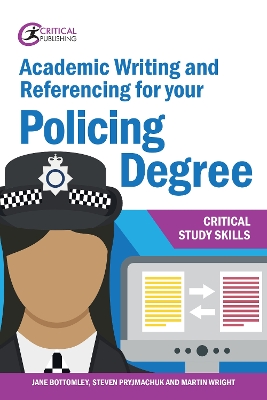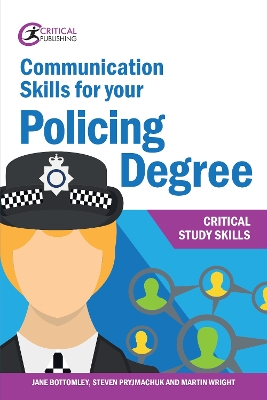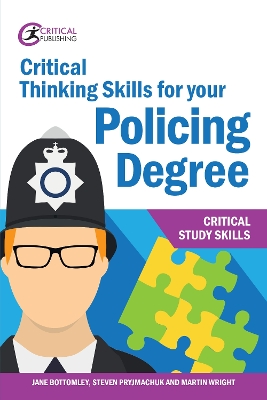Critical Study Skills: Police
3 total works
Academic Writing and Referencing for your Policing Degree
by Jane Bottomley, Steven Pryjmachuk, and Martin Wright
If you are embarking on a university criminology, policing or other law enforcement professional degree, the books in this series will help you acquire and develop the knowledge, skills and strategies you need to achieve your goals. They provide support in all areas important for university study, including institutional and disciplinary policy and practice, self-management, and research and communication. Tasks and activities are designed to foster aspects of learning which are valued in higher education, including learner autonomy and critical thinking, and to guide you towards reflective practice in your study and work life.
Academic Writing and Referencing for your Policing Degree provides you with a sound knowledge and understanding of:
- what constitutes good academic writing in policing
- a range of strategies for writing successful essays and reports
- the importance of clarity and coherence in your writing about policing
- how to improve your academic style, grammar and punctuation, and formatting and presentation
- referencing conventions in the field of policing, and of how to avoid plagiarism.
Communication Skills for your Policing Degree
by Jane Bottomley, Martin Wright, and Steven Pryjmachuk
If you are embarking on a university criminology, policing or other law enforcement professional degree, the books in this series will help you acquire and develop the knowledge, skills and strategies you need to achieve your goals. They provide support in all areas important for university study, including institutional and disciplinary policy and practice, self-management, and research and communication. Tasks and activities are designed to foster aspects of learning which are valued in higher education, including learner autonomy and critical thinking, and to guide you towards reflective practice in your study and work life.
Communication Skills for your Policing Degree provides you with a sound knowledge and understanding of:
- how to improve your oral and written communication skills in a range of academic and professional settings
- a range of strategies for improving your public speaking, including academic presentations
- a range of techniques for improving your practical writing and speaking skills.
Critical Thinking Skills for your Policing Degree
by Jane Bottomley, Martin Wright, and Steven Pryjmachuk
If you are embarking on a university criminology, policing or other law enforcement professional degree, the books in this series will help you acquire and develop the knowledge, skills and strategies you need to achieve your goals. They provide support in all areas important for university study, including institutional and disciplinary policy and practice, self-management, and research and communication. Tasks and activities are designed to foster aspects of learning which are valued in higher education, including learner autonomy and critical thinking, and to guide you towards reflective practice in your study and work life.
Critical Thinking Skills for your Policing Degree provides you with a sound knowledge and understanding of:
- the nature of critical thinking, and of its relevance and importance in HE
- how to adopt a critical approach to all aspects of your policing studies
- the importance of active, critical reading, and how it allows you an efficient, principled, effective assessment of the literature in your field
- the need to adopt a critical approach to writing, characterised by analytical and evaluative use of sources and the development of your own ‘voice’.


